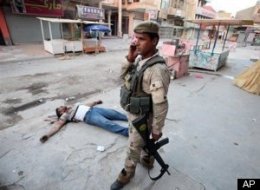 The Huffington Post:
The Huffington Post: WikiLeaks' Iraq War Logs: US Troops Abused Prisoners Years After Abu Ghraib
Despite a vigorous attempt by the Pentagon to stop WikiLeaks from releasing 400,000 pages of classified military documents about the Iraq War, the group has gone ahead with its latest document dump.
To search the documents, click here. And if you find something interesting, tell us about it by emailing wikileaks@huffingtonpost.com
Most shockingly, the documents allegedly show that US troops abused prisoners for years even after the Abu Ghraib scandal and that the US ignored systemic abuse, rape and even murder by Iraqi police and soldiers, according to several news reports.
The allegations of prisoner abuse by US troops from 2005 to 2009 occurred despite a crackdown on such behavior that was promised in the wake of the 2004 scandal over abuses at Abu Ghraib prison, according to the Bureau of Investigative Journalism, which reports that "303 allegations of abuse by coalition forces were reported in the military files after 2004."
The reports date from August 2005 until the end of 2009. They began 16 months after the Abu Ghraib scandal. Forty-two of these involve allegations of serious abuses, including the use of electric shocks, beatings, water torture and mock executions. In nearly half of these, the claims are reported to be backed up by medical examinations carried out by US medical personnel.
This video shows every incident of detainee abuse uncovered in the logs:
Detainee Abuse in Iraq from TBIJ on Vimeo.
The New York Times adds:
In a case reminiscent of Abu Ghraib, in which guards photographed themselves with Iraqis whom they had posed in humiliating positions, a soldier was censured for writing a mocking slur with a marker on the forehead of a crying detainee.
The Guardian reports:
• US authorities failed to investigate hundreds of reports of abuse, torture, rape and even murder by Iraqi police and soldiers whose conduct appears to be systematic and normally unpunished.
• A US helicopter gunship involved in a notorious Baghdad incident had previously killed Iraqi insurgents after they tried to surrender.
• More than 15,000 civilians died in previously unknown incidents. US and UK officials have insisted that no official record of civilian casualties exists but the logs record 66,081 non-combatant deaths out of a total of 109,000 fatalities.
The Guardian includes an incredible Google Map of every death in Iraq.
The documents include accounts of Iraqi forces sodomizing and electrocuting prisoners, according to Al-Jazeera News, which has been collaborating along with The Guardian and Le Monde with WikiLeaks on the latest document dump.
In addition, Al-Jazeera is reporting that the documents include more revelations about prisoner abuse, the first official civilian deathcount, tales of murder at military checkpoints and the role of Blackwater, the controversial contractor.
The New York Times reports that the documents describe at least 6 deaths of prisoners in the custody of Iraqi military and police forces and a "ground-level look at the shadow war between US and Iraqi militias backed by Iran's Revolutionary Guards." In addition to showing how the Iranian paramilitary group and Hezbollah have trained Shiite militia leaders involved in kidnapping and murder in Iraq, the reports demonstrate:
Citing the testimony of detainees, a captured militant's diary and numerous uncovered weapons caches, among other intelligence, the field reports recount Iran's role in providing Iraqi militia fighters with rockets, magnetic bombs that can be attached to the underside of cars, "explosively formed penetrators," or E.F.P.'s, which are the most lethal type of roadside bomb in Iraq, and other weapons. Those include powerful .50-caliber rifles and the Misagh-1, an Iranian replica of a portable Chinese surface-to-air missile, which, according to the reports, was fired at American helicopters and downed one in east Baghdad in July 2007.
A Pentagon spokesman strongly condemned WikiLeaks's upcoming release, noting that the documents "expose secret information that could make our troops even more vulnerable to attack in the future. Just as with the leaked Afghan documents, we know our enemies will mine this information looking for insights into how we operate, cultivate sources, and react in combat situations, even the capability of our equipment. This security breach could very well get our troops and those they are fighting with killed."
No comments:
Post a Comment
Note: Only a member of this blog may post a comment.